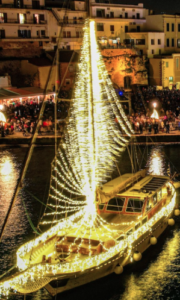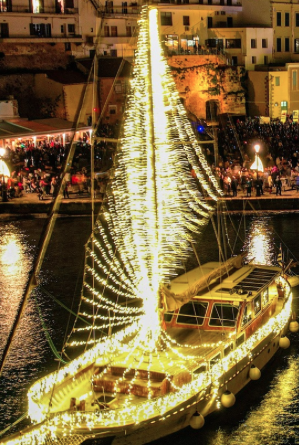Greek Christmas traditions
With this brief overview of Greek Christmas traditions the Kissamos News Team wishes all our readers a most blessed Christmas and a happy and healthy New Year!
Although Christmas in Greece nowadays very much resembles the holiday celebrations from other areas in the world, there are some traditions unique to Greece:
‘Karavaki’ , the Tradition of Decorating Boats — Not Trees — at Christmas.
An old traditional custom in Greek islands and coastal regions is that people decorate a boat rather than an evergreen tree at Christmas time.
Although nowadays almost every Greek household does decorate a Christmas tree, there are still a number of public spaces where one can see a Christmas boat right next to a tree.
The tradition of the ‘Karavaki’, which is the Greek word for ‘small boat’, is deeply rooted in the country’s symbiotic relationship with the sea. In fact, on many Greek islands the Christmassy-decorated boats still remain the most popular symbol of this beautiful holiday season.
There is no exact reason, however, why many Greeks traditionally decorate a boat at Christmast ime rather than a tree.
The most plausible explanation would be that the residents of the southern islands of the Aegean Sea were simply not used to trees at all.
Their islands are dry, arid places where the only trees that can be found are short, scrubby bushes or perhaps an odd wild-growing olive tree.
So what would be more natural for them than to decorate something they know well — a boat?
In the past, nearly all the men of the islands would often be away for months at a time, and their families back home would be anxiously waiting for their return..
Somewhere out there, their men were battling the stormy seas during the holiday season in order to be able to bring back home their much-needed cargoes of fish. These were months full of expectation, hope, and prayer for the sailors’ safe return.
‘Kallikantzaroi’
According to the Greek version of the universal myth of evil spirits, our world connects to the underworld through a tree. The evil spirits, or kallikantzaroi, spend their year beneath that tree, sawing their way into the outer world.
During the Twelve days of Christmas, the period stretching from December 25 to January 6, the kallikantzaroi rise to our world because Christ, not being baptized yet, cannot protect humanity from evil. When households are not ready to protect themselves, the evil spirits wander freely in and out bringing distress and frustration. People keep them away by burning logs, incense, and even old shoes.
Feeding the fountain
This tradition is to be found in different corners of mainland Greece. During the twelve days of Christmas, the young women of the village carry empty pitchers to nearby fountains and fill them with water. However, they are requested to walk towards the fountain in complete silence.
These women reach the fountain carrying with them butter, cereals, or honey to please the fountain. The first woman who gets to the fountain is blessed with lots of good luck for the rest of the year.
The squill (skeletoura in Greek) is a rather common wild bulb very similar to an onion and quite difficult to dig up the ground. Since the skeletoura continues to flourish after it’s been dug up, tradition places it as a symbol of eternity.
Families in Greece hung them at the front door on New Year’s Eve and then kept it in the house for the rest of the year to bring longevity, health and good luck to every person in the house.
‘Agios Vasilis’
In Greece, Santa Claus is not Saint Nicholas, but Saint Basil, (Agios Vasilis) and he does not visit the Greek houses on the 25th of December, he arrives a week later, on New Year’s Day, when the Greeks traditionally exchange their Christmas presents.
Vasilopita, the cake the Greeks share on the first day of the year is closely related to the saint. According to one story, the tradition comes from his life, when an emperor had put a large tax during a time of great famine. People gave away their jewelry to pay, but the saint called the emperor to repent and he did.
The emperor gave all the jewelry back but no one knew what belonged to whom so Basil decided to bake the jewelry into bread and cut pieces for his people. Miraculously everyone received in their bread their own belongings that they had paid as tax.
‘Kalanta’ (Christmas Carols)
Christmas Eve in Greece is filled with Christmas carolling from very early in the morning. Groups of children will go from door to door with music triangles and sing traditional Christmas carols, known as ‘kalanta’. The kalantas the children sing begin with Jesus’ birth, before going into songs praising the house and the people they are singing to. The kalanta ends with the children asking for a gift, which will often be a small amount of money, as well as a dessert such as a melomakarona (honey-orange-nuts cookies) or kourabiedes (sugar-coated butter-almond cookies).
Find out more about Greek Christmas traditions here.
Source: greekherald.com, greekreporter.gr


